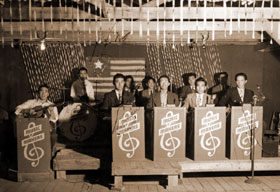|
This is an archived article.
For the latest news, go to the Advance Homepage
For more archives, go to the Advance Archive/Search Page. |
|||
Author To Discuss Japanese American
Internment
The event will take place on Thursday, Feb. 19 at 2 p.m. in the Dodd Center's Konover Auditorium. Yoshida is founder of the San Francisco-based swing band, J-Town Jazz Ensemble, and former saxophone player in a band in the Poston, Ariz., internment camp during the Second World War. He was subsequently inducted into the U.S. Army and trained with the Military Intelligence Service Language School at Fort Snelling, Minn. Yoshida is a member of the Nisei - second-generation Japanese Americans born and raised in the United States - whose stoicism about their unjust incarceration during World War II contrasted with the optimism that characterized the '40s era music they enjoyed. Yoshida considers the bands that formed in the camps an extension of the American life and culture they embraced, even in the face of extreme prejudice and marginalization.
Following the Japanese bombing of Pearl Harbor, President Franklin Delano Roosevelt authorized the summary removal of Japanese aliens and American citizens of Japanese ancestry from their West Coast homes. Without due process of law, nearly 120,000 Japanese American citizens, Japanese permanent residents, and Japanese Latin Americans were incarcerated under armed guard in camps located in remote areas of the United States. Nine of the 10 camps formed swing bands with names like The Stardusters, The Jive Bombers, and The D-Elevens. The Heart Mountain, Wyoming, camp band was invited several times by outside groups to entertain at dances and benefits for war bonds. The Day of Remembrance at UConn is an annual event.
Pulitzer Prize-Winning Poet To Speak
February 10
Muldoon is scheduled to speak at 7:30 p.m., Feb. 10, at the Thomas J. Dodd Research Center. Despite winning the most prestigious of literary awards, Muldoon, a Northern Ireland native, who has lived in the United States since 1978, is still a down-to-earth writer who believes that more people would appreciate poetry if it were taught differently. "Young people have often been put off poetry," he says, "because of the difficulty insisted upon it by teachers." Muldoon, a Princeton University professor whose mother was a schoolteacher, does his part to help eliminate this fear by meeting with K-12 teachers and students. Muldoon's books include New Weather, The Annals of Chile, Why Brownlee Left, Madoc: A Mystery, and Moy Sand and Gravel, his 25th volume of original verse and the one for which he won the Pulitzer. The New York Times has described him as "the most significant English language poet born since the Second World War." But even prior to winning the Pulitzer, Muldoon was long recognized as the poet of his generation in both Ireland and Britain. During his life, Muldoon has worked as a BBC producer, a cabaret opera writer, and a laborer. Elizabeth Shanley Gerson, an Irish orphan who died in 1997, had a great love of Irish literature. She earned a bachelor's degree from UConn in 1948 and a master of social work degree in 1978. Her husband, Louis L. Gerson, was long-time chair of the political science department. The Elizabeth Shanley Gerson Memorial Irish Literature program was established by the family in her memory, to bring distinguished Irish writers to Storrs each year to meet with students and faculty, and read from their work. |

